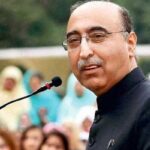
By Ambassador Abdul Basit
Pakistan was greylisted by the 39-member inter-governmental Financial Action Task Force (FATF) in June 2018. That was the time when Pakistan was preparing for the general elections in July and was being run by a three-month caretaker setup as provided for under the country’s constitution.
Pakistan has been through many crises. It is high time for the FATF to free itself of politically skewed considerations. Pakistan deserves to be appreciated and supported in its unflinching drive against money laundering and terror financing by tightening both its legal and regulatory regimes.
Merits or demerits of Pakistan’s case aside, the timing itself showed that the FATF decision was not apolitical. Ideally, the organization should have waited for the general elections to be over and then entered into talks with the new government; outlined its concerns; given some time to plug the legal and regulatory loopholes; and in case of reluctance on the part of Pakistan to do the needful, then moved to put the country on the grey list. The way Pakistan was treated or being treated by the FATF reflects poorly on its credentials. After all, according to the FATF itself, barring a dozen or so countries in the world, every other country is still only partially compliant with the FATF guidelines. Pakistan was no exception. Putting it on the grey list was, therefore, hardly convincing, to say the least.
Interestingly, this is not the first time Pakistan is on the grey list. Even it had been on the blacklist momentarily before it was greylisted in 2012. As the country scrupulously addressed several deficiencies in its banking system, it was finally removed from the grey list in 2015. It’s a fair question to ask as to what Pakistan had done or not done that warranted the FATF to grey list it again in 2018.
Pakistan has never claimed that its systems are foolproof. Nor has it ever shied away to acknowledge and fix them. The best course of action for the FATF would have been to take up with Pakistan its 27-point plan of action with the incoming government in 2018 and worked out timelines for actions on different fronts. By preempting the incoming government, the FATF only compounded the situation for Pakistan, and it was rightly inferred by many analysts that the FATF decision was largely politically motivated, driven by geopolitical dynamics.
Needless to mention that many developed economies are also still struggling to completely extirpate these dangerous malpractices. In fact, some of them are directly benefiting from money laundering involving developing countries.
Whether it is Afghanistan or Kashmir, one cannot escape the fact that there are countries that would like Pakistan to fall in line. And this is best done by economic strangulation.
FATF was aware of Pakistan’s massive economic difficulties. With the mounting internal and external debts, the growing current account imbalance, and the unsustainable fiscal account deficit, Pakistan, as a front-line state in countering terrorism, was rightly expecting to be supported by the international community. Instead what it got was most unfair. The people of Pakistan, having suffered hugely from terrorism both in terms of blood and treasure should have been facilitated to get to grips with their enormous economic difficulties. Au contraire, the FATF, riding roughshod over Pakistan’s problems, contributed to accentuating its woes, and in the process even restricting political space for the government to legislate through national consensus.
One country, namely, India, with its own very poor record and the recent revelations of its banking sector’s complicity in large-scale money laundering, is even working to get Pakistan on the blacklist
Be that as it may, Pakistan deserves full credit to have come up with an impressive report card. Despite serious issues, Pakistan had done remarkably well to be in full compliance with 21 out of 27 action points by October 2020. Islamabad yet again demonstrated how seriously it took its international obligations, primarily in its own national interests. No country can put its economic house in order unless it is willing and resolved to close all the possibilities for money laundering and terror financing to the maximum extent possible. Needless to mention that many developed economies are also still struggling to completely extirpate these dangerous malpractices. In fact, some of them are directly benefiting from money laundering involving developing countries.
The next plenary of the FATF is scheduled for the third week of next month. Before that, the Asia-Pacific Group would meet to, inter alia, consider and review Pakistan’s compliance report and accordingly prepare recommendations for submission to the FATF plenary. Countries that would never like Pakistan to be off the grey list, have already embarked on a malicious campaign against Pakistan. One country, namely, India, with its own very poor record and the recent revelations of its banking sector’s complicity in large-scale money laundering, is even working to get Pakistan on the blacklist. FATF must not become hostage to the nefarious political agendas of such countries if it were to restore its credibility as a fair and transparent organization.
Pakistan has been through many crises. It is high time for the FATF to free itself of politically skewed considerations. Pakistan deserves to be appreciated and supported in its unflinching drive against money laundering and terror financing by tightening both its legal and regulatory regimes. It is thus hoped that the FATF at it upcoming meeting would take the right decision by whitelisting Pakistan. The country has come a long way in fighting terrorism and correcting its financial systems. It must be encouraged by the FATF rather than to be treated unfairly at the behest of a country or two for their own tendentious agendas against Pakistan.
